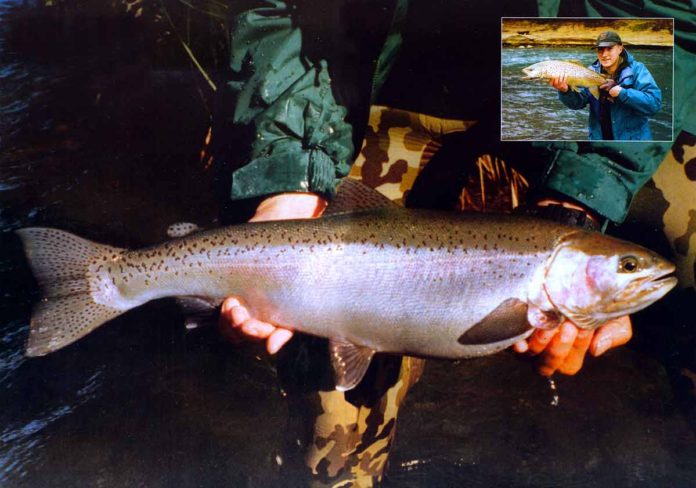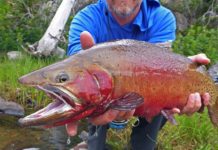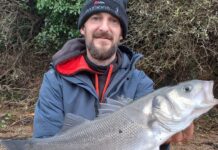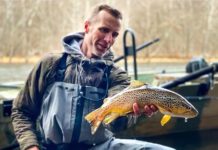A typical “fresh” rainbow trout from the Whitikau Pool. Inset: The author with a Tongariro River brown trout.
By Tom Fraser

The Tongariro can be an intimidating river and sitting in the pre-dawn gloom with the frost settling on me, it dawned upon me just how easily someone could approach this river, be overawed and have very little success. We were excited to be finally fishing the world-famous Tongariro River Trout fishery that every trout angler yearns to fish at least once.
Peter and I, as first-timers were fortunate to be spending the week with Mike and Roger, two experienced “Tongaririans”. Their advice, suggestions and experience made it that much easier to adapt to fishing the Tongariro way. Having been used to 5 or 6 weight rigs, it took some patience getting used to casting an 8 weight rod with a large, heavily weighted lead eye nymph called a ‘bomb’ (for good reason), ‘Glo-bug‘ and fluoro indicator.
However, I soon adapted and got down to the serious business of catching fish. We put in the time and were fortunate to discover some prime lies and get good numbers of quality brownies and rainbows. Therefore, to be the first on the water, early starts were the order of the day and hence my cold wait.
It was soon apparent which pools were hot and those in which you would plug away for hours for little reward. Likewise, we soon learned the effect of Mt Ruapehu’s ash in the river, with the trout keeping well away from the silty and sandy areas. Instead, they preferred the deep, rocky lies which were often extremely close to the bank. In some hot spots we “discovered”, the most effective method was to simply cast 15 feet ahead and let the nymphs drift by, only 6 feet from the bank. Often the strike would occur right under your feet. Indeed, at the “G Spot”, we landed ll fish in an afternoon between the four of us using this method.
The Tongariro River Trout Were in Excellent Condition
The great condition of the trout made for exciting fishing. They were plump and fought hard with even the smaller fish proving a handful, particularly when upon netting you discover the net is frozen! While we released most, a couple were kept each day to feed the troops.
This raised an interesting point and one that was reinforced when we visited the Fisheries Unit at the Department of Conservation in Turangi. They told us that between 50,000 and 60,000 trout travel up the Tongariro annually to spawn and the majority of the fish are in the river at the one time. Therefore, taking fish is no problem and often advantageous. Likewise, it was fascinating to learn the history of a tagged brownie that Roger took into the unit, and in particular its change in size and weight and the length of time it had spent in the Whitikau Stream while spawning.
The number of other anglers on the river continued to amaze me throughout the week and as it didn’t take long for the word to get around, if one pool was fishing well we often had 7 or 8 guys on the one pool! The Whitikau and Cliff Pools were prime examples. We found other anglers generally very friendly, although it was obvious some objected to the South Islanders fishing “their water”.
My only problem with another angler was when through a lack of communication I wore Peter’s ‘bomb’ and Glo-bug in the face. Uncomfortable to say the least, but Rogers surgical hands soon had the incriminating evidence removed. Needless to say, I quickly reverted to wearing glasses and hat and for the rest of the week, the sound of a ‘bomb’ in close proximity had me turning away and adopting the foetal position!
Our efforts weren’t just confined to the “Big T”. Most nights saw us fishing the Taupo Lake edge, although with little success. Our disappointment led to a memorable team talk from Mike on the requirements of night fishing. From then on we approached the lake with the intensity of an All Black front row on test day and I even found myself retrieving the Doll-Fly and Woolly Bugger to the rhythms of the Smashing Pumpkins!
Tongariro River Trout Fishing Tackle
There was little variation in tackle used by different anglers. The use of heavy ‘bombs’ was imperative and Glo-bugs were popular. However, we soon discovered the effectiveness of a Hare and Copper or Pheasant Tail nymph with a good number of large brownies, including three double-figure fish caught on them.
No need for a surgically precise leader up there! The weight of the ‘bomb’ is enough to propel any nylon forward. However, in saying that, I still tapered my 10A leader from 12 lb to 10 lb to 8 lb Maxima. From the ‘bomb’ I’d have up to 2A of 6 lb tippet and then my nymph. Some people considered this too light but I had no problems with it and lost no more flies than others using heavier tippet.
My final impressions of the “Big T”, FANTASTIC!

If you get the opportunity to fish the Tongariro, then grab it. There are ample opportunities to catch good numbers of quality fish and experience the flyfishing ‘culture’ that is Turangi. The advent of ash in the river from Mt Ruapehu has anglers in two camps, with regard to the effection the fishery. From an outsiders point of view and as a new kid on the Tongariro’s block, I have to say we still experienced top quality angling. However, it saying that we put in long hours and it was simply a case of learning where not to fish, ie, in the sandy and silty areas. The colour of the river isn’t particularly aesthetic, nor is the occasional smell of sulphur but ultimately the fish still have to travel up the river.
We all take home fond memories of our fishing trips and certainly won’t forget out triple hook-up in the Cliff Pool with Mike desperately trying to make it a quad. Neither will I forget fishing in the snow (my hands won’t let me) and ultimately the great camaraderie. Oh yeah, Tongariro River Trout fishing, I’ll be back!

Credit: Source link































